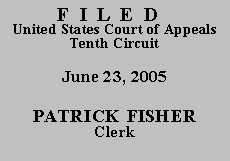

| UNITED STATES OF AMERICA,
Plaintiff-Appellee, |
|
| v. | |
| LAMONT WILLIAMS,
Defendant-Appellant. |
|
On September 10, 1999, Williams was indicted, along with nine other defendants, for conspiracy to possess with intent to distribute and to distribute cocaine and cocaine base in violation of 21 U.S.C. § 846. The case proceeded to trial and Williams was found guilty as charged. On November 9, 2000, Williams was sentenced to a term of imprisonment of 240 months. Williams filed a direct appeal challenging both his conviction and sentence. This court, in an unpublished decision, affirmed Williams' conviction but remanded his case for resentencing on the grounds that the district court had erred in calculating the amount of drugs attributable to him. United States v. Williams, Nos. 005235, 00-5236, 00-5241, 00-5242, 00-5144, 2002 WL 1815916 (10th Cir. Aug. 8, 2002). Williams was resentenced on March 24, 2003, to 240 months' imprisonment. Williams did not file an appeal from his resentencing.
On September 24, 2004, Williams, appearing pro se, filed a motion seeking to vacate, set aside, or correct his sentence pursuant to 28 U.S.C. § 2255. In his motion, Williams asserted that his sentence was invalid in light of the Supreme Court's decision in Blakely v. Washington, 123 S.Ct. 2531 (2004). Williams also asserted that his trial counsel performed in a constitutionally ineffective manner during trial by failing to challenge testimony provided by government witness Shawn Alexander. Alexander testified at trial that cocaine was transported from California to Tulsa in a yellow Ford Mustang. Once in Tulsa, Alexander testified, the cocaine was removed from the Mustang and distributed to Williams and other co-defendants. In his § 2255 motion, Williams argued that his trial counsel failed to offer expert testimony or object to testimony offered by Alexander that he used a screwdriver to remove a panel on the Mustang.(*)
On November 22, 2004, the district court issued an order denying Williams' § 2255 motion. The district court rejected Williams' Blakely-based attack on his sentence, noting that the Supreme Court "did not hold that Blakely ha[d] retroactive application." ROA, Vol. I, Doc. 634, at 6. As for Williams' ineffective assistance claim, the district court, applying the standards for such claims outlined by the Supreme Court in Strickland v. Washington, 466 U.S. 668 (1984), concluded that Williams had failed to establish that his trial counsel was ineffective for failing to challenge Alexander's testimony in the respect asserted by Williams. Although Williams subsequently sought a COA from the district court, the district court never acted on that request, and thus the request is deemed denied. See United States v. Kennedy, 225 F.3d 1187, 1193 n.3 (10th Cir. 2000). Williams has now applied for a COA from this court.
To be entitled to COA, Williams must make "a substantial showing of the denial of a constitutional right." 28 U.S.C. § 2253(c)(2). To make the requisite showing, Williams must demonstrate "that reasonable jurists could debate whether (or, for that matter, agree that) the petition should have been resolved in a different manner or that the issues presented were adequate to deserve encouragement to proceed further." Miller-El v. Cockrell, 537 U.S. 322, 336 (2003) (quotations omitted).
We find no basis for granting a COA with respect to Williams' Blakely claim. In United States v. Price, 400 F.3d 844, 849 (10th Cir. 2005), we held that "Blakely does not apply retroactively to convictions that were already final at the time the [Supreme] Court decided Blakely, June 24, 2004." Here, Williams' conviction and sentence were clearly final by that date, since he was resentenced on March 24, 2003, and chose not to appeal from that resentencing. Thus, neither Blakely, nor the Supreme Court's more recent decision in United States v. Booker, 125 S.Ct. 738 (2005) (extending Blakely to the federal sentencing guidelines), apply retroactively to Williams' case. See United States v. Bellamy, No. 04-5145, 2005 WL 1406176, at *3 (10th Cir. June 16, 2005) (concluding "Booker does not apply retroactively to initial habeas petitions"). Although Williams argues that his case is an exception because at the time of sentencing he asserted a claim based on Apprendi v. New Jersey, 530 U.S. 466 (2000), we have held that Blakely "announced a new rule" of criminal procedure. Price, 400 F.3d at 848. Thus, Williams' assertion of an Apprendi claim at the time of sentencing does not preserve his current Blakely claim.
We likewise conclude that Williams has failed to establish his entitlement to a COA with respect to his ineffective assistance of counsel claim. In particular, after reviewing the record on appeal, we agree with the district court that Williams has "fail[ed] to indicate how the use of any particular tool to remove cocaine from the [M]ustang, if investigated or proven, would have been exculpatory evidence as to the issue of whether cocaine was transported from California to Tulsa for delivery to Williams and other co-defendants." ROA, Vol. I, Doc. 634, at 4. Thus, we find no basis for concluding that Williams' ineffective assistance claim should have been resolved in a different manner.
The request for a COA is DENIED and the appeal is DISMISSED. Appellant's motion to proceed in forma pauperis is granted.
Entered for the Court
Mary Beck Briscoe
Circuit Judge
*. Williams' § 2255 motion included additional claims of ineffective assistance, but Williams has abandoned those claims on appeal.